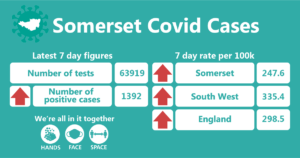Welcome to the latest edition of the weekly Somerset Covid-19 update for key stakeholders. This update is produced on behalf of the Somerset Covid-19 Engagement Board and is designed to provide a weekly update on the current Covid-19 situation in Somerset.
Along with the rest of the South-West, unfortunately we have seen our case numbers rise over the last week. To keep yourself and those around you safe, we continue to strongly recommend you get both doses of the Covid-19 vaccine, participate in testing and self-isolate when required. Although it’s no longer a legal requirement, we also recommend you continue to wear a face covering, keep your distance, meet outdoors and let plenty of fresh air into indoor spaces.
Next Monday there will be further changes to Government guidelines, including a change to self-isolation guidance which we have summarised for you.
Alongside this, we will be launching the next phase of our summer campaign to keep Somerset safe, and as always, we’d love your support please.
In this week’s Covid Catch Up, Clinton discusses the impact Covid-19 has had on people’s alcohol consumption with Councillor Clare Paul. While most of the population reported drinking the same or less, nationally it is estimated more than eight million people drank more during lockdown, and habits formed quickly can be hard to break. Clinton also meets with Sally Farmer, a local pharmacist, to chat about a new support service for those of us who drink more than we should but are not dependent on alcohol. You can watch the video on YouTube.
Latest Covid Dashboard: The following link below will take you to our website: Coronavirus (COVID-19) (somerset.gov.uk) Then scroll down the page until you get to ‘COVID-19 Dashboard’ in the list. Click on this and the dashboard will open.
‘Remember, everyone can catch it, anyone can spread it’.



| David Fothergill, Leader of Somerset County Council Twitter: @DJAFothergill | Trudi Grant, Director of Public Health Twitter: @SomersetDPH | Clare Paul, Cabinet Member for Public Health and Wellbeing Twitter: @Clarepaul_ |

In the week up to 8 August approximately 63919 tests were carried out across the county and there have been 1392 new confirmed cases. The rates have increased to 247.6 per 100,000 however we still remain below both the South-West and England rates.
From the public dashboard, the vaccination data shows further progress with 94.2% of the 18+ Somerset population having received at least one vaccination and 80.7% two vaccinations.
We have now added data on hospitalisation rates across our two main providers Somerset Foundation Trust and Yeovil District Hospital to the dashboard. This is published weekly on Thursday up to the Tuesday before and comes from NHS England public data. As of 10 August there were 47 inpatients with a positive Covid-19 test.
THIS WEEK’S HEADLINES:
The main items featured in this week’s update are:
- Change to self-isolation rules
- Workplace, care and school settings
- Summer Campaign
- Vaccination update
- Testing Update
- Resources and further information
Change to self-isolation rules from 16 August:
From Monday 16 August, changes are being made to the self-isolation rules. From this date, people who are double vaccinated or aged under 18 years and 6 months will no longer be legally required to self-isolate if they are identified as a close contact* of a positive Covid-19 case. With 75 percent of people having received both doses of the vaccine, the majority of adults will no longer need to self-isolate if they are contacts. However, the following groups will still be required to self-isolate:
- Those who have not received their Covid-19 vaccination
- Those who have not received both doses of the Covid-19 vaccination
- Those who have received their second does within the last 14 days
- Those who have tested positive following a PCR test
- Those who have been fully vaccinated but are displaying symptoms of Covid (ahead of getting a PCR test)
People can order a PCR home test by going on the Somerset County Council website or by calling 119 or going to a test site.
Of course, despite being vaccinated, those identified as close contacts are still at risk of being infected, so the Government continues to advise wearing a face covering in enclosed spaces and limiting contact with other people, especially with anyone who is clinically extremely vulnerable. There will be no requirement to self-isolate while waiting for the results of the PCR test.
Anyone who tests positive following the follow up PCR test will still be legally required to self-isolate, irrespective of their vaccination status or age, in order to break onwards chains of transmission. Meanwhile anyone who develops Covid-19 symptoms should self-isolate and get a PCR test and remain in isolation until the result comes back.
Exemptions from self-isolation for close contacts will also apply to:
- Clinical trial participants: those who have taken part in, or are currently taking part in, an MHRA approved vaccine clinical trial. Those who received their final dose of an MRHA approved vaccine in the UK vaccination programme at least 14 days prior to contact with a positive case
- Medical exemptions: those who can evidence that they cannot be vaccinated for medical reasons
Anyone who would qualify for the self-isolation exemption and is part-way through their self-isolation period on 16 August (having been identified as a close contact) can stop self-isolating on that date.
*Close contact is defined as:
- having face-to-face contact with someone at a distance of less than 1 metre.
- spending more than 15 minutes within 2 metres of an individual.
- travelling in a car or other small vehicle with an individual or in close proximity to an individual on an aeroplane.
Workplaces: We continue to see many workplaces affected by staff cases and the knock-on effects of contacts isolating. For the most part these cases appear to be reflecting transmission in the wider community, rather than being outbreaks in the workplace itself, as most workplaces have retained at least some controls to minimise transmission, such as enhanced ventilation, social distancing and face coverings.
As highlighted in the section above, from Monday 16 August workers who have been double vaccinated, with at least 14 days having passed since the second jab, will no longer be required to isolate as a close contact. Instead, they should obtain a free PCR test, and take precautions to protect others until the result is received. If the result is negative they can resume normal activities. If the result is positive they must isolate for 10 days from the date of the test, or onset of symptoms if that occurs before the test is taken. The rules are slightly different for health and social care workers.
Anyone who is already isolating as a contact can come out of isolation on Monday, provided they haven’t tested positive or become symptomatic in the meantime.
The rules have not changed for cases. Cases must still isolate for the whole 10 days. However, their household contacts do not need to do so, but again household contacts should take a PCR test and take precautions to minimise risk of transmission, both to themselves as people sharing the house with a case, and to others if they should subsequently test positive. The risk of becoming positive in a household setting is higher than in workplace settings due to the amount of time we spend indoors with our family members, so contacts should remain alert to symptoms developing even if they test negative on PCR, as the disease may not appear for up to 14 days. Keep your windows open to significantly reduce the risk of transmission from the case to others.
The Daily Contact Testing (DCT) approach will remain in place for those businesses participating. This will be for those workers who are not fully vaccinated, which is achieved 14 days after the second dose. Businesses wishing to participate in DCT must approach their sponsoring government department e.g. DEFRA for the food sector.
Care Sector:
Self-isolation guidance: In order to mitigate the increased risk associated with an exemption from self-isolation, fully vaccinated health and social care staff who are identified as a contact and are exempt from the legal duty to self-isolate will be required to follow additional mitigations to attend their workplace:
- the staff member should remain free of Covid-19 symptoms
- the staff member should immediately arrange for a PCR test, either through their workplace arrangements or via the NHS Test and Trace service, and the result of this PCR test should be negative prior to returning to work
- following the negative PCR result, the staff member should undertake an LFD antigen test every day for 10 days following their last contact with the case (even on days they are not at work)
- if a staff member has had a SARS-CoV-2 infection in the past 90 days, they should not have a PCR test and should only undertake daily LFD antigen tests
- on days the staff member is working, this LFD antigen test should be taken before starting their shift, and the result should be negative
- the staff member should comply with all relevant infection control precautions and PPE should be properly worn throughout the day
- if the staff member works with patients or residents who are highly vulnerable to Covid-19 (as determined by the organisation), a risk assessment should be undertaken, and consideration given to redeployment during their 10 day period
Unvaccinated or partially vaccinated staff members who are exempt from self-isolation should not attend work or should be redeployed for the period of time they would be required to self-isolate. The Covid-19: management of staff and exposed patients or residents in health and social care settings guidance will be updated to reflect these changes.
Vaccination for pregnant care workers: We are aware that a number of care staff have declined vaccination on the basis of concerns around pregnancy, England’s top midwife is urging expectant mums to get the Covid-19 vaccine after new data shows the overwhelming majority of pregnant women hospitalised with the virus have not had a jab. Please read the vaccination section of this update on page 8 for more information about this important subject.
Vaccination for care workers: It will be mandatory for care home workers to have Covid 19 vaccinations later this year with the following timescales:
- 22 July 2021 – 16 week grace period starts
- 16 September 2021 – last date for care home workers to get their first dose to be fully vaccinated when regulations come into force
- 11 November 2021 – regulations come into force
Further information: For information related to Covid 19 for adult care providers please visit Somerset Safeguarding Adults Board.
Schools and Early Years settings: Due to the summer holidays we are seeing very little transmission within secondary schools and age 16+ settings, as they are closed. As you will see below, the cases we do have are attributed to either residential settings or summer workshops. We are seeing relatively little transmission happen within nurseries and most transmission is happening within the community. In the week to 8 August there were 17 cases identified at 16 nursery settings, the majority of these are single staff cases who have been contracted outside of work.
Summer campaign: As part of the next phase of our Summer Safety campaign. We’re encouraging residents and visitors to show respect for Somerset and commit to keeping our county safe this summer. With the easing of restrictions, we know people are eager to return to a more normal way of life and this includes enjoying everything our beautiful county has to offer. However, Coronavirus is still very much in circulation and our numbers are rising, so we recommend that visitors and residents continue to:
- Wash your hands regularly
- Wear a face covering in enclosed spaces
- Practice social distancing
- When meeting indoors, make sure the space is well-ventilated
- Take an LFT test regularly
- Self-isolate as required
As part of the campaign, businesses, community spaces, tourist attractions and other local organisations will be encouraged to show their support in keeping Somerset Safe by downloading or receiving promotional posters and postcards. Bespoke information and resources will also be available to download; providing settings and visitors with information and advice on staying safe.
We will be encouraging everyone to support our messaging and the campaign by posting on their social media channels with the hashtag #SomersetInItTogether. In return, we are offering free entry into our competition to win Love2shop vouchers.
Please find attached two posters for displaying. The webpage will be live later today. Thanks in advance for your support.
Vaccination Update: For the latest information about the Somerset vaccination programme please visit the NHS website.
For the latest information about vaccination clinics and walk-in centres across the county, please visit the NHS website.
Last week we told you that England’s top midwife is urging expectant mums to get the Covid-19 vaccine after new data shows the overwhelming majority of pregnant women hospitalised with the virus have not been vaccinated. The same data also shows that no pregnant women who have received both doses of the vaccine have been admitted to hospital.
Any pregnant women who have questions or concerns about the vaccine can speak to their GP, midwife or obstetrician to get more information and advice. Locally, you can talk to our Vaccine Buddies (see below) Even if you have previously declined the vaccine, you can change your mind and book an appointment to get it on the NHS National Booking Service website or call 119 between 7am and 11pm.
And what about fertility and breastfeeding? The advice is that there is no need to avoid pregnancy after the vaccination. There is no evidence that the vaccines have any effect on fertility or your chances of becoming pregnant. The JCVI has recommended that the vaccines can be received whilst breastfeeding, and this is in line with recommendations from the USA and the World Health Organization. You can read more about this on the GOV.uk webiste.
Do you have, or know someone who has concerns over receiving the Covid-19 Vaccine? We have a team of trained Vaccination buddies who are here to help! The programme enables people to be offered support via a ‘buddy’ who can help them to make informed decisions about having the Covid-19 vaccination.
People can be referred (or self-refer) to the scheme and a Vaccination Buddy will contact them by phone to discuss their concerns and offer information and reassurance. Vaccination Buddies come from all walks of life and have the necessary skills and knowledge to support people in a friendly, non-judgemental way.
Vaccination scams: We are aware of some scams relating to having the Covid-19 vaccine. You may be unfortunate to receive a scam text message, or more rarely, some people are calling door to door. Please remember that the vaccine is free of charge on the NHS, and you will NEVER be asked for:
- your bank account or card details
- your pin or banking password
- copies of personal documents to prove your identity such as your passport, driving licence, bills or pay slip
If you think you have been a victim of fraud or identify theft, report it to Action Fraud on 0300 123 2040. For more information, go to the NHS website.
Testing: New LFT testing kits are now in circulation. The advantage of the new kits is that they only require both nostrils to be swabbed, and a result will be available within 15 minutes. However, the process is slightly different so please do read the instructions provided with the kit that you receive, or watch a video which shows you how to use both new kits by visiting the GOV.uk website.
If you would like more information about lateral flow testing, please visit the Somerset County Council website.
You can call 119 or click on the following link to order lateral flow tests online to be delivered to your home via the NHS website. You can also collect a kit at a local pharmacy. For the time being, while pharmacies use up existing stock, you may still be given one of the old Innova test kits. Please remember to report your LFT result on the GOV.uk website.
If you have symptoms of Covid-19 it is important that you take a PCR test, which can be done by phoning 119 or ordering a test on the GOV.uk website.
Resources and further information: Please do keep an eye our Healthy Somerset website, which has a huge amount of information and resources to help keep everyone healthy happy and safe at this time.
For the latest local information as well as digital resources, posters and flyers please visit the Somerset County Council website.
The Somerset Local Outbreak Management Plan outlines how we, the council, will work with the NHS Test and Trace Service, PHE, the NHS and other partners to ensure a whole system approach to preventing and managing local outbreaks. This can be found here.
Finally, please like them on Facebook, follow them on Twitter and share their posts with your networks to help them in communicating these important messages. Follow their Director of Public Health Twitter account too.

